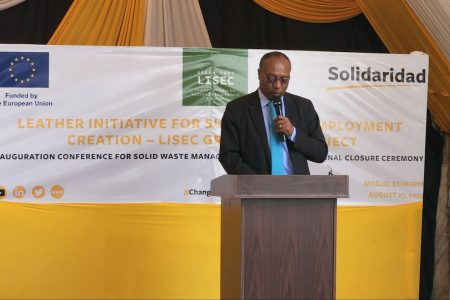Addis Ababa, August 27, 2024 (FBC) – The Ethiopian Manufacturing Industry Development Institute (MIDI) has emphasized the importance of enhancing waste treatment facilities to foster environmentally friendly and sustainable industrialization in the nation.
This statement was made by Milkessa Jagemma, Director General of MIDI, during the opening of a pilot tannery solid waste treatment facility at the Colba Tannery Factory in Modjo town, Oromia Regional State.


The initiative was implemented by Solidaridad, an international civil society organization active in over 40 countries, in collaboration with People in Need (PiN) and the European Union (EU).
In his remarks at the inauguration, Milkessa highlighted the manufacturing sector as one of key pillars of Ethiopia’s economy, urging the industry to align with the government’s vision of achieving a climate-resilient green economy.
He stated that the pilot project at Colba Tannery could serve as a model for national efforts to promote environmentally friendly waste management system throughout the country.
“Waste is wealth if managed properly,” Milkessa stressed, advocating for leather processing firms and other industries to adopt similar sustainable practices as those implemented at the Colba Tannery facility. He acknowledged the leather industry sector’s contributions to the national “Made in Ethiopia” initiative, which aims to provide the market with a diverse range of homemade products.
Milkessa commended the pilot project for its potential to enhance pollution prevention, promote technology transfer, and facilitate the creation of green jobs.


He noted that the initiative could improve the quality of leather products, thereby increasing foreign currency earnings from international markets. Furthermore, he pointed out that the project effectively addresses environmental challenges associated with tanneries across the country.
Sanka Sepe, Ethiopia Country Manager for Solidaridad, explained that the solid waste treatment facility at Colba Tannery is part of its Green Tanning Initiative Ethiopia (GTI), aimed at developing technologies to minimize the environmental impact of leather processing while creating sustainable employment opportunities in the industry.
The facility will facilitate the prevention of environmental pollution, optimize resource use, and promote the transfer of green technologies to help mitigate the effects of tanneries on the environment. It aligns with international standards and the national green initiatives led by Prime Minister Abiy Ahmed aimed at fostering clean and livable environments across Ethiopia.
Stephen Kithuka, Head of Programmes for Solidaridad East and Central Africa, reiterated the organization’s commitment to supporting Ethiopia’s transformative efforts in key sectors such as manufacturing and agriculture. He pledged to assist in capacity building and technology transfer to enhance the quality of leather products.
Daniel Tesfaye, Project Manager of Solidaridad’s Leather Initiative for Sustainable Employment Creation (LISEC) Green Job Project, noted that the recycled products generated from the pilot project, including organic glue, leather cords, and compost, are expected to boost productivity across various sectors, including small scale manufacturing enterprises and poultry and egg production.
He said the Tannery Solid Waste Treatment facility would help ensures zero waste from the facility and address community grievances through addressing issues related to environmental pollution.
Kebede Amede, Manager of Colba Tannery Factory, said that the factory is implementing environmental policies to ensure that every imported and exported product is eco-friendly.
Some of the recycled products made as part of the pilot project from by-products of sheep, goat and bull skins and hides such as protein fillers and other materials are being used by the same facility, Kebede said.
Colba has identified 10 wastes for the treatment including buffing dust, and by-products from chrome shaving, leather trimming and skin trimming and recycling them into various valuable multipurpose products with a capacity to produce 400 Kg protein filler, organic glue and other materials daily, according to Kebede.
Kebede announced a plan to showcase products of Colba Tannery Plant at All China Leather Exhibition.
The inauguration event was attended by federal and regional government officials, researchers, international organization representatives, and other stakeholders, marking a significant step toward sustainable industrial practices in Ethiopia.
